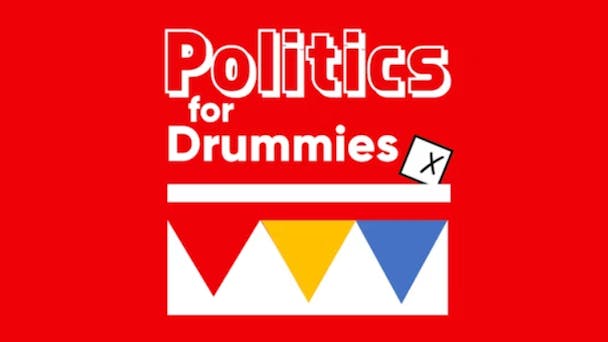‘It’s hard to use temperate language about Trump and that’s his superpower’
Karin Robinson, former vice-chair at Democrats Abroad and current senior director of strategy at Edelman, shares her thoughts with Alastair Duncan in latest episode of the Politics for Drummies podcast.

US political campaigner Karin Robinson speaks out on Politics for Drummies
Karin Robinson spent four years between 2009 and 2013 encouraging Americans residing outside of the states to support former Democrat president Barack Obama in his bid for the top seat in US politics. That was obviously mission successful, and while her marketing career has taken her to one of the top seats at Edelman, Robinson remains a passionate political campaigner and commentator.
In this episode of Politics for Drummies, Robinson talks candidly to host Alastair Duncan about navigating the challenges of contemporary politics and sheds light on the art of persuasion, the impact of managed communications and the evolving landscape of US elections.
Robinson remains critical of Donald Trump’s campaigning tactics: “America had been polarized before he [Trump] came along, but I think he hit a particular nerve. He hit the sweet spot of all of our vulnerabilities and weaknesses. It’s not just [people saying], ‘I’m a loyal Democrat. That’s why I hate you.’ People on both sides and in both parties think that the other party is a material threat to their lives and wellbeing.
Advertisement
“I find Donald Trump – and I have since the beginning of his campaign – very difficult to communicate about because it’s hard to use temperate language. It’s his superpower, right? That he’s able to get attention and drive everyone to the most extreme version of themselves. Both the people on his side and the people who oppose him. It’s very hard to speak honestly about who he is without sounding like you’re being intemperate and unreasonable.”
Global political processes have long come under heavy criticism, but Robinson outlines to Duncan that her belief in the systems that drive elections and ultimately deliver power to our leaders is at an all-time low.
“The ‘Trust Barometer’ has been telling us for years that trust is declining across many of the institutions that we rely upon to run a stable electoral democracy, not least the media and government itself,” she says.
Advertisement
“We are in a difficult place and there is a vicious cycle whereby the distrust in each of these institutions fuels the distrust in the others. Because the media is largely trusted, our politics has become more contentious. Of course, we’ve seen people withdrawing from mainstream media regarding how they communicate, so political campaigns no longer rely upon the media to get their messages out because they can now speak directly to their core audience.
“But of course, the challenge behind that, and one of the things fueling this kind of institutional lack of trust and global lack of trust, is that we all communicate and live in bubbles. We exist in communities that are self-reinforcing. For politics, that’s really challenging. And it makes it hard for us to manufacture consensus in ways that would allow for a politics that is less polarized.”
Suggested newsletters for you
Robinson also reflects on campaigning and what she learned during the heady days when she was helping to build brand Obama, though she is loathed to take the credit for getting UK-based Americans to back him for office.
“I think it was that a lot of people just really liked Obama, so I can’t personally take much of the credit. At the time, I think our job was more about we had a lot of latent enthusiasm or interest, but people didn’t know how to direct that enthusiasm. A big part of our job during that campaign was helping people understand what is useful for the campaign and how to direct their energies – getting them off the internet often and directing them towards useful and constructive activities.
A lot of people were spending their time blogging or Facebooking about the campaign. This was just before the heyday of Twitter. So, if we found them doing that, we would say, ‘That’s great, but actually, maybe you could focus on a “Get Out the Vote“ message or you could focus on a voter registration message.’
“We had people kind of gather together and literally just leaflet and canvass people on the street in areas that we knew had many American experts. Now, was that an efficient use of our time? No. But we had surplus volunteers and we needed to keep them energized, give them something exciting to do to make them feel involved and committed.”

